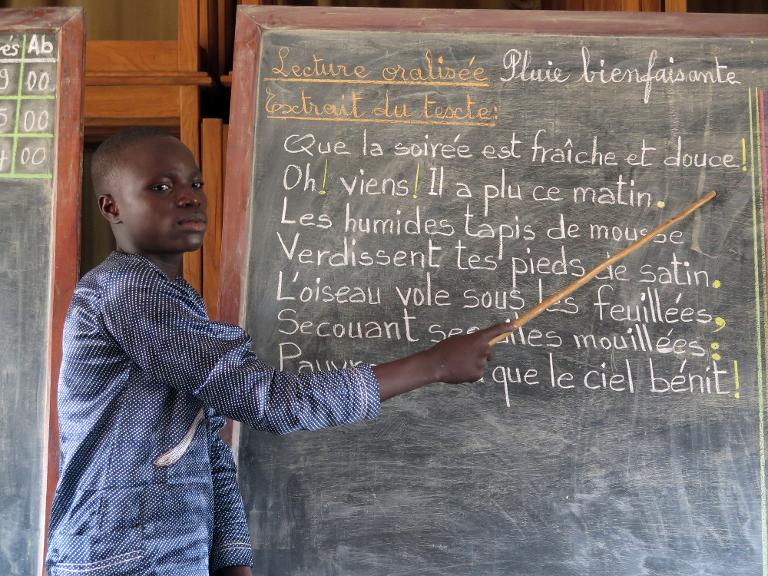
School scheme gives Benin's apprentices a second chance
The 17-year-olds are among 18 students at an accelerated learning programme (PCA) in Pobe, a rural community of some 150,000 people in southeast Benin.
The school gives a second chance to children aged 10 to 17 who are outside the education system, giving them three years' tuition in French and maths when normally it would take six.
The numbers of children at school in Benin increased in 2013 to 98 percent but there are still an estimated 700,000 teenagers out of education in the impoverished west African nation.
Primary school education is free but for large families who have to pay for uniforms, equipment and lunch, it's often too expensive.
- Schoolwork and apprenticeships -
Felix and Azizath are in the classroom every day from 8:00 am to 12:00 pm. They then work as apprentices making clothes, sometimes long into the evening, depending on the number of orders.
Like his three brothers and sisters, Felix, who lives in a village outside Pobe and comes to school on a motorbike, was illiterate.
His boss, Denis Omolekan is head of the PCA parents' association, and enrolled him in the school two and a half years ago.
"I was wondering what I would do with him and I heard about the PCA on the radio. I had the chance to go to school. I speak French and not just Yoruba or Gun. That allowed me to develop," he said.
Omolekan gently corrects Felix's mistakes at the workshop as the teenager compared not knowing how to read or write as effectively being dead.
"But now I know everything. And I'm happy. When my boss is not here, I can see the clients and take the measurements on my own," he said proudly with a shy smile.
"School is good," he added enthusiastically. "We don't buy anything there. We learn. I'm grateful to those who set up the school."
Azizath dropped out of school at the age of eight when her father died. She lives with her grandmother. An uncle put her into the PCA then found her a job at the workshop.
"I like to stitch and I also like to learn," she whispered timidly. "As I had to stop school early I don't know anything."
- Investment for the future -
Azizath's boss, Irene Fakambi, also agreed to allow her to go to school, leaving eight other apprentices to cut and sew colourful cloth.
She said the teenager is a gifted student and is catching up quickly. She also sees Azizath's education as an advantage.
"A girl who goes to school understands quickly and learns the job in two years. A girl who hasn't gone to school can take five years. Education is important, especially for women," she added.
Such bosses are rare. The majority don't want their apprentices to leave, believing education to be a waste of time and effort, even in Pobe, where the first PCA was launched in 2012.
Pobe's mayor, Saliou Akadiri, is a former diplomat and admitted that parents and even children themselves were resistant and preferred learning a trade over school.
"Their lives don't allow them to always go to class. But it's important to involve them so that the PCA students catch up what they've lost and can succeed in the future," he added.
The municipal authorities have budgeted three million CFA francs ($5,200, 4,600 euros) this year to pay for the premises and the three teachers at its two PCA centres.
The programme began life as a partnership between the mayor's office, the government and the UN children's fund.
Currently there are 56 in 27 municipalities across Benin, with 2,500 young people at school, according to UNICEF, and more towns are expected to set up similar schemes.
- Self-motivation required -
Victor Goudjo, a retired teacher who applied to teach at the PCA, described the work as "fascinating".
"The students are very willing, they get to work quickly. Because of their age and their background, they are more mature than the others. That's what makes the teaching we do here great," he said.
But the PCA has encountered a problem. In Pobe, about a dozen out of the 30 students have dropped out mid-way, according to Sero Bagri, an education specialist with UNICEF.
"The school is demanding especially for apprentices. It's hard to do both. Some of them, such as the mechanics, find it hard to leave the workshop and attend infrequently.
"It requires a great deal of motivation to attend properly."
Felix and Azizath are motivated. They will sit their primary school certificate leaving certificate at the end of the year.
Azizath sleeps at her boss' house to be near the school. Her brother Marouf, 21, a journalism student, is supporting her.
Felix wants to continue in fashion. Azizath has a dream: "I want to continue my studies and become a doctor."

Legal Disclaimer:
MENAFN provides the
information “as is” without warranty of any kind. We do not accept
any responsibility or liability for the accuracy, content, images,
videos, licenses, completeness, legality, or reliability of the information
contained in this article. If you have any complaints or copyright
issues related to this article, kindly contact the provider above.
















Comments
No comment